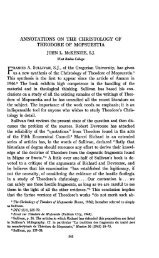SYMBOL, MYTH, AND THE BIBLICAL REVELATION AVERY ...
SYMBOL, MYTH, AND THE BIBLICAL REVELATION AVERY ...
SYMBOL, MYTH, AND THE BIBLICAL REVELATION AVERY ...
Create successful ePaper yourself
Turn your PDF publications into a flip-book with our unique Google optimized e-Paper software.
<strong>SYMBOL</strong>, <strong>MYTH</strong>, <strong>AND</strong> <strong>THE</strong> <strong>BIBLICAL</strong> <strong>REVELATION</strong> 3<br />
represent because it addresses itself not simply to the senses and the<br />
abstractive intelligence, but to the entire human psyche. It works on<br />
the imagination, the will, and the emotions, and thus elicits a response<br />
from the whole man. Symbols, therefore, have an existential power<br />
which is lacking to purely conventional or conceptual signs. Symbols<br />
are of vast importance not simply for cognitive purposes but also for<br />
the integration of the human personality, for the cohesion of human<br />
societies, and for the corporate life of religious groups. A religion without<br />
symbolism would be unthinkable.<br />
Symbols may be found in the natural world, in the events of history,<br />
and in the inventions of art and literature. The Bible abounds in literary<br />
symbolism, thanks to its poetic and vivid style; but, more fundamentally,<br />
it is symbolic because it has to do with symbolic realities,<br />
especially with symbolic historical events.<br />
The central theme of both Testaments is quite evidently the great<br />
series of mighty deeds by which God manifested His mercy, His loving<br />
power, and His enduring fidelity toward the people of His choice.<br />
These deeds may be called God's gestures in history, and like human<br />
gestures they are symbolic. The divine deed par excellence is the<br />
miracle. A miracle, according to the biblical conception, is a sign-event<br />
in which a properly attuned religious consciousness can recognize, so<br />
to speak, the handwriting of God. For those who have eyes to see and<br />
ears to hear, the miracles are eloquent. Like Caesar's wounds, they<br />
have tongues of their own. 3 They reveal, with compelling realism and<br />
vividness, what Paul calls the "philanthropy of God our Saviour"<br />
(Tit 3:5).<br />
Quite apart from particular miracles—the true value of which has<br />
unfortunately been obscured by the opportunistic apologetics of a<br />
rationalistic age—the entire history of Israel constitutes, one may say,<br />
an immense continuing deed of God and stands as an everlasting reminder<br />
of God's justice and mercy. The individual operations of God<br />
which punctuate this history—such as the crossing of the Reed Sea,<br />
the manna in the desert, the entry into the Promised Land, and the<br />
return of the exiles from Babylon—are heavily charged with symbolic<br />
8 Cf. the famous words of Augustine concerning the miracles of Christ: "Interrogemus<br />
ipsa miracula, quid nobis loquantur de Christo; habent enim, si intelligantur, linguam<br />
suam. Nam quia ipse Christus Verbum Dei est, etiam factum Verbi verbum nobis est"<br />
(In evang. Ioh. 24, 1 [Corpus christianorum, series latina 36, 244]).
















